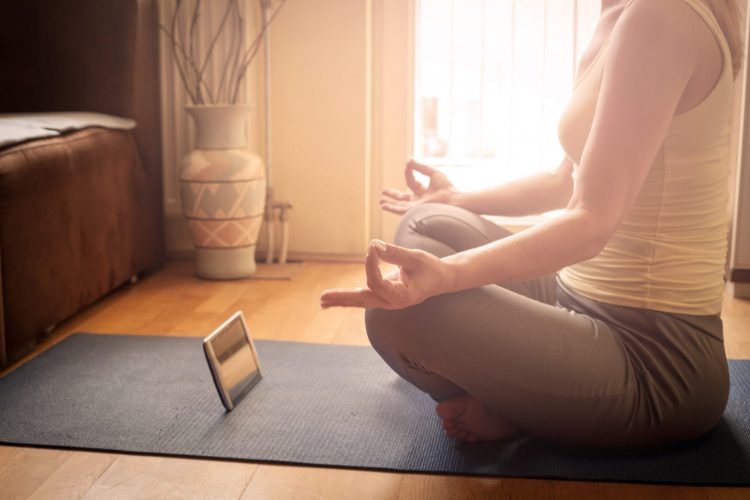 Source: iStock.com/EllenaZ
Source: iStock.com/EllenaZ
Mindfulness with apps as a new smartphone hype
19. August 2020 Published by Raphael DoerrEveryone knows the expression: “An apple a day keeps the doctor away.” Nowadays it’s “A meditation a day keeps the doctor away.” That’s the conclusion scientists reached in a study by Harvard University. They found that meditation exercises help reduce stress levels and strengthen the immune system, with the result that you feel more balanced, mindful and relaxed and subjectively also more healthy.
Mindful living, meditation and mindfulness stand today for a spirit of the age that speaks to and attracts more and more people. Especially in stressful times like these, people pay far more attention to their environment, to what’s happening in society, but also much more to their body and their health. It’s all about mindfulness these days. And that can be practiced with the aid of a mindfulness app.
All it needs is a corresponding app and a robust outdoor smartphone like the Gigaset GX290 to provide the perfect acoustic and visual setting to do the meditation exercises on the beach or in nature. Mindfulness apps are currently experiencing a real hype, with more than 250 different meditation apps on offer in the Google Play Store alone.
The Gigaset GX290 smartphone is also ideal for doing meditation exercises on the beach.
“Mental fitness is the new physical fitness,” is what the American company Calm, which is doing very successfully in the meditation and mindfulness market with its eponymous app, also claims. While hardly any researchers dealt with the topic of mindfulness in 2000, almost 400 scientific texts on the subject were published in 2014 and around 800 in 2018. Mindfulness is the “in” thing in the public eye. It’s reported on regularly in newspapers and magazines. If you Google “mindfulness”, you’ll get a whopping 118,000,000 hits. A search on Amazon on the topic of Mindfulness guides produces a similarly high number of hits. The market for mindfulness apps is booming. One of the best-known among them, the “Calm” app, already posted an impressive 80.5 million US dollars in annual revenue in 2018, even before the coronavirus crisis. That’s an increase of 361 percent over the previous year. As much as 150 million US dollars are even expected for 2019.
Growing demand, booming market
People all over the world begin their day with meditation instructions, exercises to combat stress or short relaxation sessions. They open an app on their smartphone and listen to a voice guiding them through a short meditation – for five, seven or ten minutes. To clear the mind before the madness begins on the train and in the office. Among the most popular apps available in German are, according to Priori Data: Calm, Headspace and Meditopia.
The meditation apps in the brief ticker
Here we present two of the many apps to you. Since we were unable to test them ourselves, we did extensive research and refer in the review to current test results and reports from users.
Calm down
“Calm down” is what Calm says on its website, and the name of the company is also what the app is all about. “The meditation app ‘Calm’ uses calming sounds, breathing programs and sleep stories for better sleep, less stress and an overall more relaxed lifestyle,” as the fitforfun magazine writes. Tester Katharina Klein has tried out the app. “Purely in visual terms, the app design impresses me immediately. Gentle typeface, modern colors and appealing, calming pictures make you want to try out the programs. The categories are divided into sleep, meditation, music and breathing. Each of these contains, in turn, subcategories that cater to specific individual needs. Under meditation, for example, these are self-love, inner peace, stress, fears, but also feelings, relationships and personal development. That means you can choose your own personal program to suit your current mood. […] All the basics are explained clearly, you get useful tips presented by a relaxing voice, and can do relaxation and breathing exercises straight away.”
Headspace for beginners
According to Techradar, this app is especially suitable for beginners. Headspace is one of the most popular meditation and sleep apps and allegedly already has more than 66 million users worldwide. “The app helps you get started with daily practice through an easy-to-use interface full of color, simple instructions, and fantastic visual presentations that show what happens during meditation. […] This is a great first stop for beginners who want to familiarize themselves with meditation. The best thing about it is that there are so many different types of meditation that you can try out for all kinds of situations, whether it’s practicing simple mindfulness, meditation for children, for getting to sleep, or when you’re busy, including mindful cooking,” as both authors Becca Caddy and Ralf Renner write. If you want to be inspired, you should watch the TED talk “All it takes is 10 mindful minutes” by the founder of Headspace Andy Puddicombe from 2013. In it he talks about the importance of giving your mind regular rest. All it needs is 10 minutes to take a step back and be in the moment for concentration, peace and clarity in life, to be equipped for the really important aspects of life.
Seek and you shall find
There are numerous advantages that speak in favor of meditation, as supported by a wide variety of research teams. According to a study by the Max Planck Society, meditation helps relieve stress. A study by the psychologist Jayde Flett and her colleagues from the University of Otago in New Zealand reached similar results. “Flett and her colleagues also compared two mindfulness apps – Headspace was one of them – with another app that can be used to make notes. The latter served as a kind of digital placebo. 200 students used either the mindfulness or notes app for ten minutes a day over ten days. The result: After ten days, the users of Headspace had significantly fewer depressive symptoms, fears or stress than the control group.” Even though not everything is exactly scientifically proven, many studies do at least show that regular meditation leads to more stress resistance, concentration, satisfaction and creativity. Anyone who wants to find out more about meditation apps can do so on the “Dicker Buddah” Internet site (in German).
The right smartphone for the app
But all the studies are of little use if the app doesn’t meet the user’s expectations, so you should simply Google test reports and recommendations online and try them out yourself. No matter which app a user opts for, they won’t have much success without the right smartphone. Two models are ideal for this: For home or at work, we recommend the Gigaset GS290 with its extra-large V-Notch display to ensure that the pictures and videos on the relaxation exercises are also razor-sharp. And for meditation outdoors or on vacation by the sea, the waterproof, dustproof and shockproof Gigaset GX290 with an extremely long battery life.

 en
en 









3 Comments
Nice list, those are some great apps to have.
I would really like it if you could have a look at one of my apps which helps in waking up faster, sleeping better, and generally relaxing throughout the day. It’s called Unwind (unwind.to) and I think it’ll fit the list well.
Hi Kushagra,
Thank you – we will check out Unwind…
Very good article, it gave me another view of smartphone with meditation.